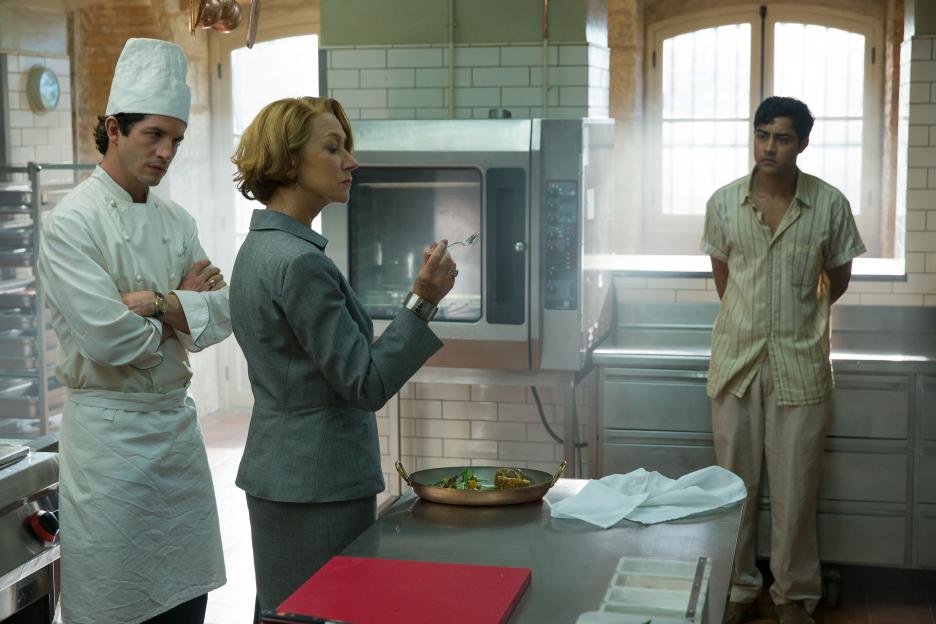“Food is memories.”
The H-Bomb: Hassan (Manish Dayal) is a young cook from India who migrates to France with his father, Papa (Om Puri), and siblings after they lose their restaurant. Their car breaks down in the middle of the French countryside, right outside a small village, which turns out to be fortuitous, as the village just happens to have an old, empty restaurant for sale. The place is certainly a fixer upper, but it has its rustic charm, so Papa and Hassan set about transforming it into an authentic Indian eatery, the likes of which this town has never seen.
There is, however, one resident of this quaint little village who is not pleased to see these new arrivals, Madame Mallory (Helen Mirren), the owner of the Michelin Star-winning restaurant located directly across the street from where Hassan and Co. are setting up shop. She doesn’t like their loud music, their lack of class, the stench of their cooking, and she especially does not like Hassan spending time with her pretty young sous chef, Marguerite (Winona Ryder doppelganger Charlotte Le Bon).
So, Madame Mallory files a noise complaint against the new Indian establishment, thus triggering a war of underhanded pettiness between her and Papa; constantly reporting each other to the village Mayor (Michel Blanc) for various ordinance violations, stealing each other’s customers, and even buying out each other’s food supplies from the local market. As this culinary crossfire has been waging, Hassan has been learning classical French cuisine, and after tasting a sample of his cooking, Madame Mallory realizes that this young man may have a way with food, after all.
Perhaps, instead of treating Hassan like an enemy, she should try embracing him as a protege…
Pleasant. That is probably the best way to describe this producing collaboration between Steven Spielberg and Oprah Winfrey, very pleasingly pleasant. Directed by Lasse Hallstrom, who brought us a prior foodie flick, Chocolat, The Hundred-Foot Journey is much like a good meal; you savor and enjoy it while your eating, but it leaves no real lasting impression, and in a few days time, you probably won’t remember it at all… aside from that you liked it.
With lovely cinematography by Linus Sandgren that captures the beauty of the French countryside, the film remains light and breezy throughout, without ever becoming too heavily dramatic at any point. Even the scene in which the Indian restaurant is vandalized by some local ruffians, and a lead character is set on fire, is not all that distressing. If anything, screenwriter Steven Knight, adapting Richard C. Morais’ book, should have punched things up, dramatically, for the sake of maintaining interest, since at a solid two hours, it runs a tad long. As it stands, what we have are mostly pleasant characters, who follow a predictably pleasant path, with some pleasant laughs thrown in along the way.
Again, it’s all so extremely, unrelentingly, disgustingly… pleasant.
The performances do quite a bit to spice up this Journey, with Mirren in an amusing turn as the stereotypical snooty French bitch, who of course, becomes more human, and far less snooty, as the film unfolds. As Hassan and Marguerite, Dayal and Le Bon are quite likable, and even though the overall film is predictable, the direction that their relationship takes about midway through isn’t. It actually takes a rather surprising turn, one that highlights that old universal truth… nobody’s perfect. It’s Puri, though, who absolutely steals the show as Papa. Proud, but stubborn and slightly clueless, just about all the laugh-out-loud moments belong to him, including the very best line in the movie, which he blurts out while admiring a photo of his son. His performance is priceless.
As for the film itself, there really isn’t a whole hell of a lot to say, truth be told. The Hundred-Foot Journey is perfectly enjoyable, though a bit bland, and entirely unremarkable. Essentially, it’s a summer movie for people who don’t like summer movies. For everyone else, it’s a rental. Foodies will certainly relish it, since much screen time is spent on the preparation and appreciation of fine food. Whatever your reasons for seeing it, be it your love of food, or your want of a way to kill a few of hours on a slow summer day, I must strongly advise, if you do decide to see it, don’t see it on an empty stomach.




